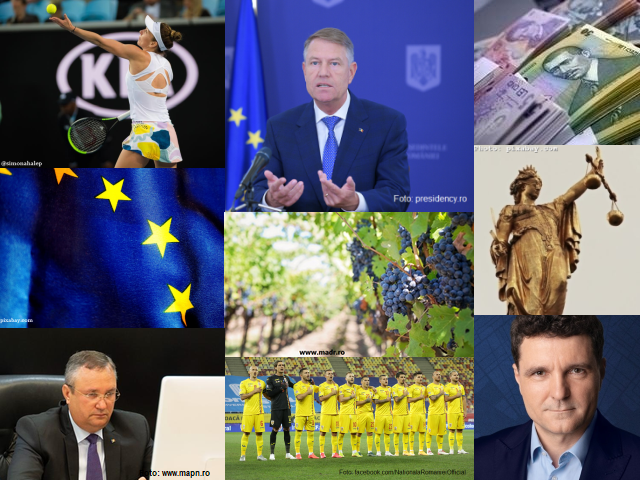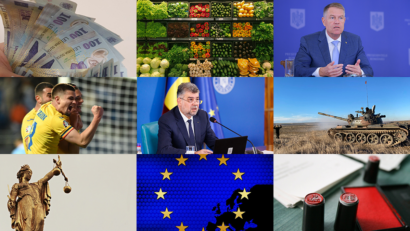THE WEEK IN REVIEW
German Chancellor Olaf Scholz reiterated in Bucharest on Monday his support for Romania joining the Schengen Space. During his meeting with President Klaus Iohannis he said that Bucharest has made great efforts to this end. In turn, President Iohannis said that Romania is meeting its role as a safeguard for the outer borders, and that Schengen would consolidate this space. He said that increased NATO presence was needed at the Black Sea. He thanked Germany for its help in strengthening the eastern flank as part of the areal defense of the countrys airspace in 2022, as well as for taking part in the NATO presence in Romania. At the forefront of the talks was the security situation created by Russias war in Ukraine. Also on Monday, Scholz and Iohannis held talks that also included Moldovan President Maia Sandu. The Romanian president pledged his continued support for the Republic of Moldova, especially given that this country is under systematic hybrid threats, including attempts to undermine constitutional order. President Sandu said that her country is the most vulnerable of Ukraines neighbors, and that it needs economic support, but it also needs help to consolidate institutions that provide security for citizens, as well as its defense system. In Bucharest, the German chancellor also talked with PM Nicolae Ciuca about issues related to partnerships and expertise exchange, especially in industry. Olaf Scholz indicated that trade between the two countries has reached a record high. PM Nicolae Ciuca said that the dynamic nature of the business environment makes it more attractive for new investments, especially in energy, foodstuffs, and the digital domain, which have a significant potential for Romania.

Mihai Pelin, 07.04.2023, 18:50
German Chancellor Olaf Scholz visits Bucharest
German Chancellor Olaf Scholz reiterated in Bucharest on Monday his support for Romania joining the Schengen Space. During his meeting with President Klaus Iohannis he said that Bucharest has made great efforts to this end. In turn, President Iohannis said that Romania is meeting its role as a safeguard for the outer borders, and that Schengen would consolidate this space. He said that increased NATO presence was needed at the Black Sea. He thanked Germany for its help in strengthening the eastern flank as part of the areal defense of the countrys airspace in 2022, as well as for taking part in the NATO presence in Romania. At the forefront of the talks was the security situation created by Russias war in Ukraine. Also on Monday, Scholz and Iohannis held talks that also included Moldovan President Maia Sandu. The Romanian president pledged his continued support for the Republic of Moldova, especially given that this country is under systematic hybrid threats, including attempts to undermine constitutional order. President Sandu said that her country is the most vulnerable of Ukraines neighbors, and that it needs economic support, but it also needs help to consolidate institutions that provide security for citizens, as well as its defense system. In Bucharest, the German chancellor also talked with PM Nicolae Ciuca about issues related to partnerships and expertise exchange, especially in industry. Olaf Scholz indicated that trade between the two countries has reached a record high. PM Nicolae Ciuca said that the dynamic nature of the business environment makes it more attractive for new investments, especially in energy, foodstuffs, and the digital domain, which have a significant potential for Romania.
Two European Commissioners visit Romania
PM Nicolae Ciuca met in Bucharest two European officials, Elisa Ferreira, commissioner for cohesion and reform, and Nicolas Schmit, commissioner for labor and social rights. They discussed the positive impact of European funds for Romanias development in the attempt to attenuate the developmental gap between regions. Ciuca thanked the European officials for their support in configuring programs associated with the policy of cohesion. At the same time he assured them that the executive in Bucharest, along with the EC, would continue to cooperate to ensure that every Euro is used towards the public interest. In turn, Elisa Ferreira expressed appreciation for Romanias economic growth, and Nicolas Schmit emphasized the fact that European funding can be good support for an equitable economic and social development of the country. Among the topics on the agenda were the support the EU grants against the background of the energy crisis, and the Russian military aggression in Ukraine.
New bills on the Chamber of Deputies floor
The Chamber of Deputies passed the bills regulating the Penal Code and the criminal procedural code, in the form submitted by the Ministry of Justice, unaltered. This comes against the scandal caused by the attempt in the Senate by ruling coalition parties to set a minimum threshold of 250,000 lei, around 50,000 Euro, below which gains from abuse of office and negligence would not be considered criminal and could not be prosecuted. This bill was drastically adjusted by the MPs, who eliminated any kind of threshold. This absence of a limit raised issues of constitutionality, however. Previously, the Constitutional Court had established that a minimum amount was necessary for the prosecution of cases, as long as damages are being calculated in order to bring indictments. The Chamber of Deputies is the decision making body for this bill. The changes in the two bills is a landmark in the National Plan for Recovery and Resilience, therefore it constitutes an obligation that Romania has in exchange for promised funding from the EU.
The executive sets a ceiling on RCA insurance premiums
The government in Bucharest set a ceiling on the so-called RCA, the obligatory car insurance, for the next six months, also setting a limit of 8% commission for insurance brokers for the same period. The decision comes after Euroins, the insurance company with the highest market share at the time, filed for bankruptcy. RCA premiums on offer are set to be those from the end of February. The decision to set the ceiling and to freeze prices was made in order to defend drivers from extreme costs, after the nefarious experience two years ago, caused by the collapse of another big player in this area, City Insurance, which was a market leader back then.
National Bank decisions
The National Bank of Romania has decided to maintain its reference interest rate at 7% per year. They also maintain at 8% the rate at which commercial banks can borrow from the National Bank, and maintain at 6% per year the interest rate for deposits kept in the central bank. These decisions are based on macroeconomic evolution over the last few months. According to estimates, the annual rate of inflation would likely rise over the upcoming period. The central bank specified that the annual rate of inflation went down to 15.52% in February from 16.37% in December 2022, more or less in line with forecasts.
Snow in April
The winter was back in force in multiple regions in Romania, with temperatures dropping significantly. There was snow and rain in almost the entire country, with gusts of wind reaching speeds of 70 to 75 km/h, disrupting air and road traffic. Hundreds were left snowed in on national and county roads, causing traffic to be shut down completely in some cases.




























